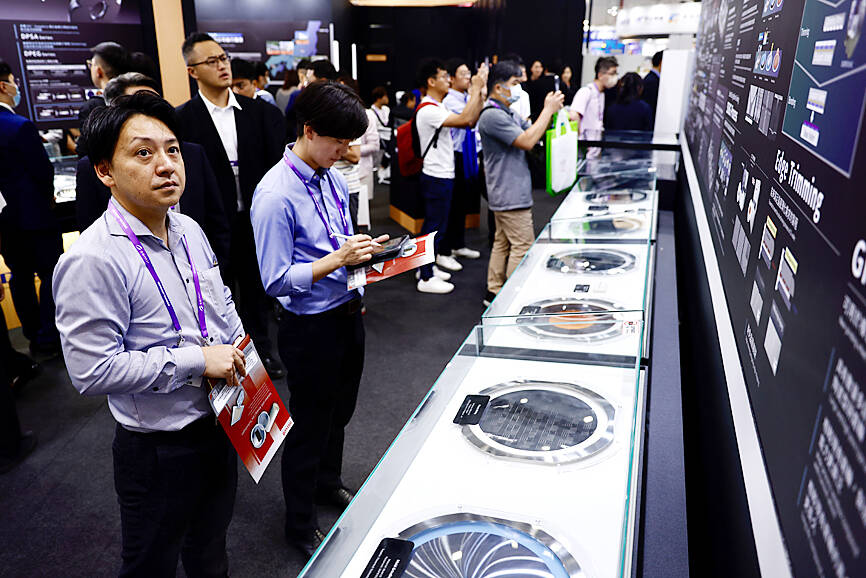A group of experts on Sunday called on Taiwan to strive to maintain its world-leading position in the semiconductor industry, with a US-China chip dispute expected to continue regardless of who becomes the next US president.
Tamkang University Graduate Institute of International Affairs and Strategic Studies director Li Da-jung (李大中) said at a Taipei seminar on global semiconductor security that the relationship between the two superpowers would remain confrontational.
There appears to be “no turning back” in US-China relations, as US presidential candidates US Vice President Kamala Harris and former US president Donald Trump are both expected to continue Washington’s hawkish stance against Beijing, including by continuing restrictions on China’s access to semiconductor technology, Li said.

Photo: Ritchie B. Tongo, EPA-EFE
Speaking during the same event, Tamkang University Graduate Institute of International Affairs and Strategic Studies assistant professor Lin Ying-yu (林穎佑) said that despite the increasing state support China’s semiconductor industry has received in the past few years, it would still be a long time before it caught up with the US in terms of advanced chip development.
Whether China could continue its efforts in developing advanced semiconductors remained uncertain, because Beijing could soon withdraw the sector’s subsidy, he said, without elaborating.
“That could mean more opportunities for Taiwanese semiconductor businesses,” Lin said.
James Yang (楊健盟) — founder of Hsinchu City-based Microip Inc (擷發科技), which provides IC design services and chip performance analysis — said at the seminar that Taiwan’s semiconductor ecosystem has developed over the past 40 years and would be difficult to replace any time soon.
Taiwan’s advantage lies not just in a few companies, but in the entire industry cluster in Hsinchu Science Park (新竹科學園區), along with the supporting talent ecosystem drawn from nearby National Tsing Hua University, National Yang Ming Chiao Tung University and the Industrial Technology Research Institute, he said.
Taiwan needs to maintain the competitiveness of its semiconductor industry amid the ongoing US-China chip dispute and other geopolitical realities, he said.
As countries compete to build their own semiconductor industries, Taiwan’s public and private sectors need to work to maintain the nation’s edge, particularly in retaining talent, he added.

Nvidia Corp CEO Jensen Huang (黃仁勳) today announced that his company has selected "Beitou Shilin" in Taipei for its new Taiwan office, called Nvidia Constellation, putting an end to months of speculation. Industry sources have said that the tech giant has been eyeing the Beitou Shilin Science Park as the site of its new overseas headquarters, and speculated that the new headquarters would be built on two plots of land designated as "T17" and "T18," which span 3.89 hectares in the park. "I think it's time for us to reveal one of the largest products we've ever built," Huang said near the

China yesterday announced anti-dumping duties as high as 74.9 percent on imports of polyoxymethylene (POM) copolymers, a type of engineering plastic, from Taiwan, the US, the EU and Japan. The Chinese Ministry of Commerce’s findings conclude a probe launched in May last year, shortly after the US sharply increased tariffs on Chinese electric vehicles, computer chips and other imports. POM copolymers can partially replace metals such as copper and zinc, and have various applications, including in auto parts, electronics and medical equipment, the Chinese ministry has said. In January, it said initial investigations had determined that dumping was taking place, and implemented preliminary

Intel Corp yesterday reinforced its determination to strengthen its partnerships with Taiwan’s ecosystem partners including original-electronic-manufacturing (OEM) companies such as Hon Hai Precision Industry Co (鴻海精密) and chipmaker United Microelectronics Corp (UMC, 聯電). “Tonight marks a new beginning. We renew our new partnership with Taiwan ecosystem,” Intel new chief executive officer Tan Lip-bu (陳立武) said at a dinner with representatives from the company’s local partners, celebrating the 40th anniversary of the US chip giant’s presence in Taiwan. Tan took the reins at Intel six weeks ago aiming to reform the chipmaker and revive its past glory. This is the first time Tan

CUSTOMERS’ BURDEN: TSMC already has operations in the US and is a foundry, so any tariff increase would mostly affect US customers, not the company, the minister said Taiwanese manufacturers are “not afraid” of US tariffs, but are concerned about being affected more heavily than regional economic competitors Japan and South Korea, Minister of Economic Affairs J.W. Kuo (郭智輝) said. “Taiwan has many advantages that other countries do not have, the most notable of which is its semiconductor ecosystem,” Kuo said. The US “must rely on Taiwan” to boost its microchip manufacturing capacities, Kuo said in an interview ahead of his one-year anniversary in office tomorrow. Taiwan has submitted a position paper under Section 232 of the US Trade Expansion Act to explain the “complementary relationship” between Taiwan and the US